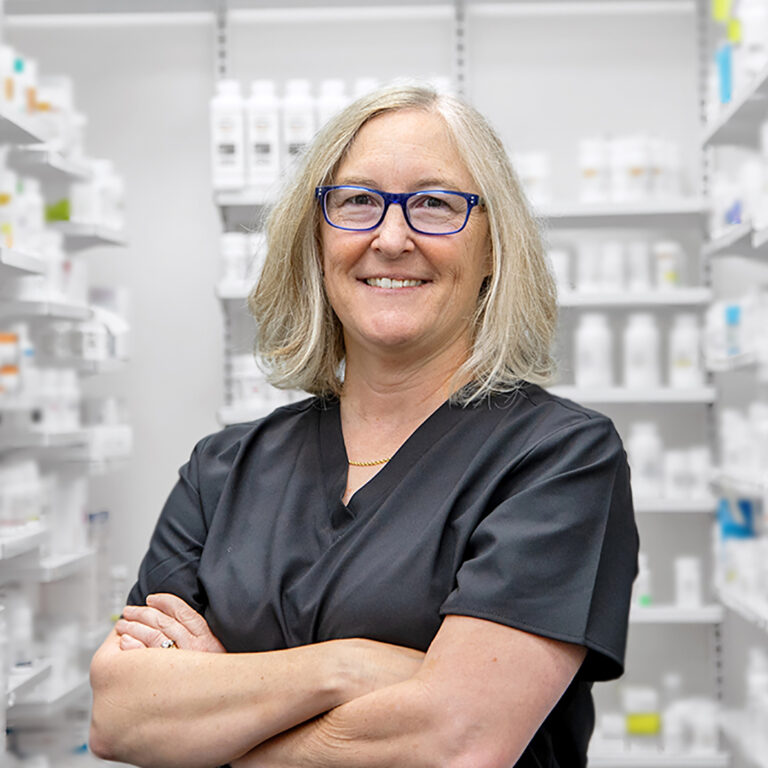
Education
- Doctor of Pharmacy from Mercer University in Macon, Georgia
- Pre-pharmacy coursework from Auburn University in Alabama
Resume
- 6 years as a pharmacy manager at Kroger in Marietta
- 1 year as district pharmacy patient care coordinator at Kroger
- 3 years as Atlanta division pharmacy sales manager at Kroger
- 7 years as Atlanta division pharmacy supervisor at Kroger
- 4 years as Atlanta division pharmacy human resource manager at Kroger
- 1 year as district pharmacy human resource coordinator at Kroger
- 6 years as a pharmacy manager at Kroger in Atlanta
- 1 year as a floater pharmacist at Kroger in Atlanta
Years in pharmacy
Praise from customers
“She always checks to make sure we are getting everything we need and at the lowest price. She looks to see when we need to use our insurance and when we need to use SingleCare.”
“She calls to check on us when she knows we are sick.”
“My husband was released from the hospital and she called just to see how he was doing. She asked how he was progressing every time I picked up prescriptions.”
Notable achievements
- American Pharmacists Association (APhA) Pharmacy-Based Immunization Delivery certified
- CPR certified
At 15, Valerie NeeSmith, Pharm.D., got her first dose of the pharmacy profession by working as a cashier at a local independent store. Yet it wasn’t her experience at the front of the store that inspired her to one day become a pharmacist.
“Every now and then, the pharmacist would let me come to the back and if they had a compound to make, they would let me help them,” Dr. NeeSmith says. “I would see the pharmacist and the pharmacy interns interacting with the patients, and that’s what inspired me.”
Now she has 29 years of experience in pharmacy and is the pharmacy manager at Kroger Pharmacy #479 in Marietta, Georgia. The profession is a family affair for Dr. NeeSmith, whose husband is also a pharmacist and has been a source of support throughout her storied career.
Video by Tanner Shinnick; produced by Deep Dive Films
As a teen she watched in awe as her town’s pharmacists helped make a difference in their community, but Dr. NeeSmith is now the one counseling patients, administering vaccines, performing health screenings, and most importantly, she says, developing relationships—even with those who come to the pharmacy not necessarily to fill a prescription.
“Kroger is a grocery store, so every now and then we’ll have someone who has a cut, scrape, or fall, and they’ll come to the pharmacy first,” she says.
It’s these relationships that help her identify any challenges or concerns that patients may have in getting the care that they need—even if they don’t know it. An experience early in her pharmacy career validated just how important these patient-pharmacist relationships can be.
“When I first started practicing pharmacy, I received a prescription over the phone and I felt pretty confident it was a forgery,” Dr. NeeSmith explains. “At the time, I was a floater pharmacist, so I traveled to different pharmacies.” She recognized the voice from the phone call as one she had heard at another pharmacy. When the patient arrived to retrieve the prescription, Dr. NeeSmith said she recognized her face.
“When she saw me, she took off,” she says. “I went after her to try to talk to her, but she got in her van and drove away. About a year later, I got a phone call from her—she had tracked me down. She said, ‘When I looked back from the car and saw that white coat trying to talk to me, I said, ‘What am I doing?’” Dr. NeeSmith recalls. “She went into recovery after that and was calling to tell me thank you.”
The experience was life-changing for the patient—but it also had a profound impact on Dr. NeeSmith. Since that time, she has used it to help guide her unwavering commitment to prioritizing patients.
Dr. NeeSmith exemplifies what it means to be the best of the best in pharmacy, which is why she was chosen as a 2023 award winner. Here, we spoke with Dr. NeeSmith about how she sets a patient-first tone for her pharmacy and the approach she takes to improve patient medication adherence.
How do you build relationships with your patients?
I know a good many of my customers, and I try to remember something little about their lives so I can follow up with them. It’s making a conscious effort to go and talk to them and take just a few seconds to listen to what they have to say.
If I have a new customer, I will introduce myself because so many patients don’t ever see their pharmacist. If I know we have a new patient coming to the pharmacy, I’ll go over and introduce myself just to let them know my name and ask if they have any other additional questions.
An important aspect of being a pharmacist is just listening to your patients. For example, with vaccines, you need to find out if it is the fear that’s holding them back or if they are worried about having some other problems with it. I listen to what the root problem is and then try to find a solution for it.
Do you have a favorite example of how you have helped a patient?
I have a customer who is an older lady and doesn’t drive. Her pharmacy is across town from here, south of Atlanta, but she was having problems getting pain medications from that location. She was in a lot of pain and didn’t know what to do.
One day she was with her daughter at her rheumatologist’s office, which is closer to my store. They came in, and we had a discussion about filling her medications—and I was able to help her get what she needed. Now, her daughter or son drives to my pharmacy on the northwest side of Atlanta every month to fill all her prescriptions.
One time I didn’t have something and I asked them, “Do you want to go somewhere else?” They said, “No, my mom won’t let me go anywhere else but here.”
What is your approach to help with patient adherence?
I don’t want to feel like a parent chastising a child, so if someone is late to pick up their medications, I’ll approach it from a personal perspective: I take medication myself, so I can draw on my own experience.
I’ll ask them, “Do you use a seven-day pill reminder or a monthly pill reminder?” I’ll say, “It’s not so much about missing a dose, but you could also forget and take a dose twice, and that can be worse than missing a dose.” A lot of times they don’t think about that side of it.
Then of course I ask them, “Has there been anything going on? Have you been in the hospital? Is there anything I can do to help? Do you have any questions about the medication?” It’s important to ask them questions to let them know you care and are trying to figure out what the challenge or barrier is. Although, it’s not always an instant fix. It’s a slow burn sometimes.
How do you put yourself in your patients’ shoes?
I used to do store management training, and I had a person once ask, “Why do pharmacies get so many complaints?” I said, “Well, let’s take a step back from that. Let’s say that you’re an older person, you don’t have a lot of family, you don’t feel well, and you had to go to the doctor, which you didn’t want to do to begin with. Then, you had to wait at the doctor’s office for a long time. Then, you have to go to the pharmacy, only for them to tell you that your prescription is a lot more money than you really care to spend—or that they don’t even have.”
The odds are people aren’t in a good mood when they get to the pharmacy. It’s very easy to get stuck in a rut where you categorize each patient into this or that if you don’t keep that in mind.
If I do have a patient who’s unhappy, I try to work with them to see what I can do. I want them to know that our pharmacy is a safe place where they can get the answers that they need and the medication that they need and they have someone here who is going to treat them like an individual.
What does winning this award mean to you?
It’s definitely an honor. I’m not one who wants the praise or the attention, but it definitely is a humbling experience and a proud moment for sure.
Praise from customers
“She always checks to make sure we are getting everything we need and at the lowest price. She looks to see when we need to use our insurance and when we need to use SingleCare.”
“She calls to check on us when she knows we are sick.”
“My husband was released from the hospital and she called just to see how he was doing. She asked how he was progressing every time I picked up prescriptions.”
Notable achievements
- American Pharmacists Association (APhA) Pharmacy-Based Immunization Delivery certified
- CPR certified

